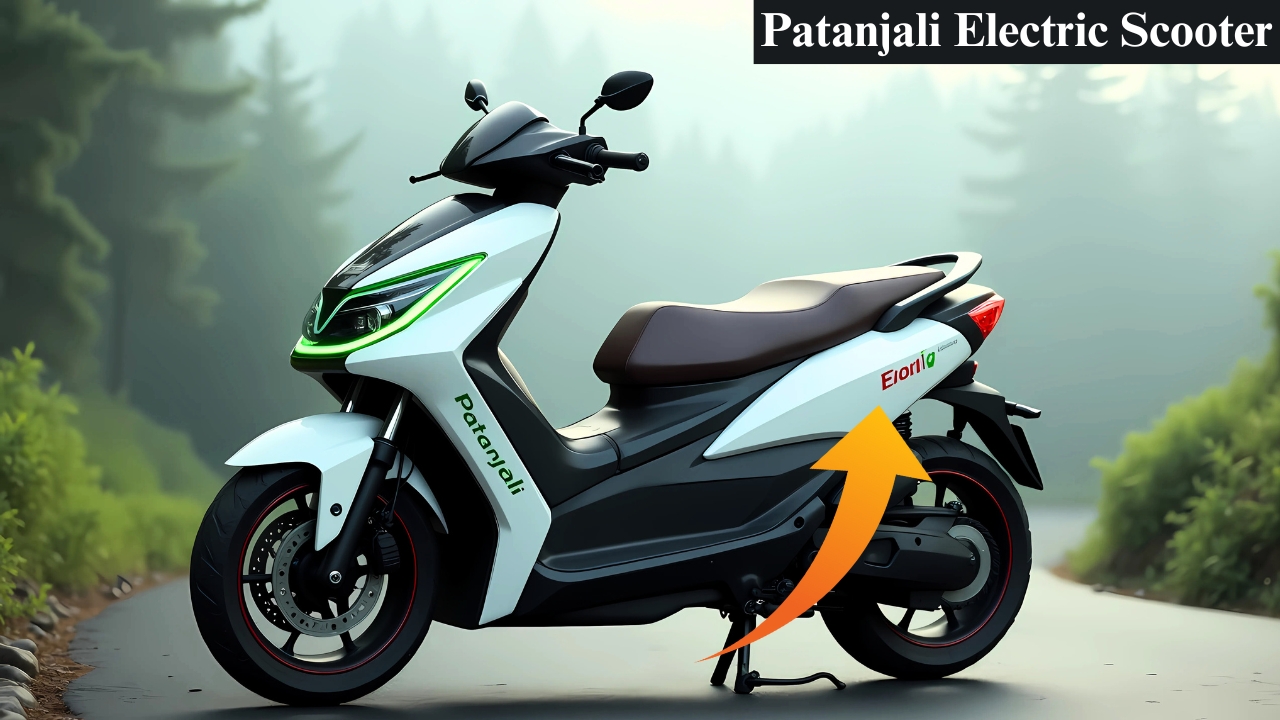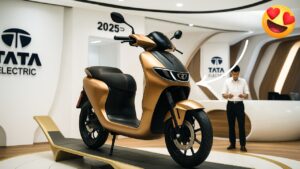In a move that’s surprising the entire automobile industry, Patanjali, best known for its dominance in Ayurveda and FMCG, has entered the electric vehicle segment—and not quietly. The company has unveiled a revolutionary electric scooter with a claimed 440 KM range, and what’s even more shocking is the price: available now at a down payment of just ₹14,000.
This announcement has shaken up both budget-conscious buyers and established EV manufacturers. Patanjali’s new electric scooter is more than just another two-wheeler—it represents a massive shift in accessibility, sustainability, and pricing strategy. It could change how India thinks about commuting, forever.
Let’s explore the full specifications, design, features, performance, and buying options of Patanjali’s game-changing electric scooter.
Patanjali’s Entry Into the EV Market
Patanjali has built its empire by offering natural, homegrown solutions to mass markets—and it’s now doing the same in electric mobility. With rising fuel prices and growing environmental concerns, India has been looking for a truly affordable and long-range electric scooter, and Patanjali seems to have delivered just that.
This launch marks Patanjali’s first major step into the automobile world, and the company claims it wants to make EVs affordable for every Indian household, just as it did with herbal products and personal care.
Stunning 440 KM Range – Real or Hype?
One of the biggest highlights of this scooter is its claimed 440 KM range on a single charge, which would put it ahead of every other electric two-wheeler currently available in India.
While most electric scooters in the market offer 100–160 km per charge, Patanjali’s new scooter reportedly uses high-density lithium-ion battery technology, optimized for extended travel. It may also include regenerative braking and energy management software to stretch the range as much as possible.
If real-world testing confirms even 350–400 KM range, it will still place this scooter miles ahead of the competition, especially considering the price point.
Simple Yet Practical Design
Patanjali has opted for a clean, simple, and practical design that prioritizes function over flash. The scooter features:
- A lightweight frame for better mileage
- Wide and comfortable seats
- LED headlamps and tail lamps
- Durable plastic body with matte finish
- Digital instrument cluster with range info and battery status
- Large under-seat storage
The design may not win style awards, but it does offer everyday utility that Indian families, students, and delivery partners will appreciate. It’s clearly built with rural and urban usability in mind, where looks matter less than function.
Motor, Performance, and Top Speed
The scooter is powered by a hub-mounted electric motor, rumored to produce around 2.5 kW of peak power, offering a top speed between 60–75 km/h. This makes it ideal for daily commuting, small-town travel, and urban routes.
It is expected to support three riding modes—Eco, City, and Sport. In Eco mode, the scooter would likely deliver the full 400+ km range, while Sport mode would offer quicker acceleration with reduced mileage.
The scooter will also include reverse mode, anti-theft alarm, and push-start button, giving it a modern EV feel without making it overly complex.
Charging Time and Battery Info
The battery is expected to be a fixed, non-removable unit, with support for both standard and fast charging. Charging times will vary based on charger:
- Standard 650W charger: 6–8 hours
- Fast charger (1.5 kW): 3–4 hours (optional upgrade)
Given the large range, most users would only need to charge once every few days, making the ownership experience far more convenient than petrol scooters or even other EVs.
The battery pack is likely to come with IP67 waterproofing and a 3–year warranty, ensuring safety and durability.
Shockingly Affordable Pricing: Just ₹14,000 Down Payment
What truly sets this scooter apart is the starting down payment of ₹14,000. Patanjali aims to bring electric mobility to the masses, especially targeting users in Tier 2, Tier 3 cities, and rural areas.
The total expected price of the scooter is ₹85,000 to ₹95,000, but with EMIs starting as low as ₹2,500/month, it becomes extremely accessible even for low-income households and small businesses.
Finance options are being tied up through multiple NBFCs and banks, and Patanjali is also considering interest-free schemes in select rural zones as part of its EV adoption initiative.
Who Is This Scooter Made For?
This scooter is tailor-made for:
- Students and college-goers
- Daily office commuters in small and large cities
- Delivery agents and gig workers
- Small businesses
- Rural households needing affordable mobility
With its long range, low cost of running, and minimal maintenance, it offers a complete mobility solution for those who need reliable daily transport at a very low cost.
Dealer Network and Availability
Patanjali is expected to launch its EVs through a dedicated sub-brand that may use existing retail stores and a newly set-up two-wheeler dealership network. The company plans to roll out deliveries in Tier 1 and Tier 2 cities first, followed by nationwide expansion.
Bookings are expected to open soon via both offline stores and the official Patanjali website. Interested buyers can expect test rides, doorstep delivery, and bundled accessories like chargers and helmets.
Comparison with Other Electric Scooters
Here’s how Patanjali’s scooter compares to current leaders in the EV market:
- Ola S1 Pro – 195 KM range, ₹1.30 lakh
- Ather 450X – 150 KM range, ₹1.35 lakh
- TVS iQube ST – 145 KM range, ₹1.40 lakh
- Patanjali EV – 440 KM range, starting at ₹85,000
Clearly, no other brand offers this level of range and pricing combination. If these claims hold up in real-world conditions, it will rewrite EV affordability in India.
Final Verdict
The Patanjali Electric Scooter 2025 is more than a new EV it’s a wake-up call to the entire industry. With a 440 KM range, practical features, and just ₹14,000 down payment, it’s built for real Indians who want clean mobility without complexity or cost.
Whether you’re a student, a farmer, a small shop owner, or an urban commuter, this scooter offers you the freedom to move without petrol, without noise, and without stress.
Patanjali might have started in Ayurveda, but with this launch, it may well become India’s most unexpected EV disruptor.


